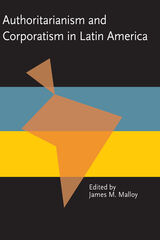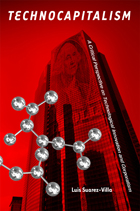3 books about Corporatism

Authoritarianism and Corporatism in Latin America
James Malloy
University of Pittsburgh Press
Since the mid-1960s it has been apparent that authoritarian regimes are not necessarily doomed to extinction as societies modernize and develop, but are potentially viable (if unpleasant) modes of organizing a society’s developmental efforts. This realization has spurred new interest among social scientists in the phenomenon of authoritarianism and one of its variants, corporatism.
The sixteen previously unpublished essays in this volume provide a focus for the discussion of authoritarianism and corporatism by clarifying various concepts, and by pointing to directions for future research utilizing them. The book is organized in four parts: a theoretical introduction; discussions of authoritarianism, corporatism, and the state; comparative and case studies; and conclusions and implications. The essays discuss authoritarianism and corporatism in Argentina, Bolivia, Brazil, Chile, Colombia, the Dominican Republic, Mexico, Peru, Uruguay, and Venezuela.
The sixteen previously unpublished essays in this volume provide a focus for the discussion of authoritarianism and corporatism by clarifying various concepts, and by pointing to directions for future research utilizing them. The book is organized in four parts: a theoretical introduction; discussions of authoritarianism, corporatism, and the state; comparative and case studies; and conclusions and implications. The essays discuss authoritarianism and corporatism in Argentina, Bolivia, Brazil, Chile, Colombia, the Dominican Republic, Mexico, Peru, Uruguay, and Venezuela.
[more]

Technocapitalism
A Critical Perspective on Technological Innovation and Corporatism
Luis Suarez-Villa
Temple University Press, 2012
A new version of capitalism, grounded in technology and science, is spawning new forms of corporate power and organization that will have major implications for the twenty-first century. Technological creativity is thereby turned into a commodity in new corporate regimes that are primarily oriented toward research and intellectual appropriation. This phenomenon is likely to have major social, economic, and political consequences, as the new corporatism becomes ever more intrusive and rapacious through its control over technology and innovation.
In his provocative book Technocapitalism, Luis Suarez-Villa addresses this phenomenon from the perspective of radical political economy and social criticism. Grounded in the premise that relations of power influence how human creativity and technology are exploited by the new corporatism, the author argues that new forms of democratic participation and resistance are needed, if the social pathologies created by this new version of capitalism are to be checked.
Considering the new sectors affected by technocapitalism, such as biotechnology, nanotechnology, bioinformatics, and genomics, Suarez-Villa deciphers the common threads of power and organization that drive their corporatization. These new sectors, and the corporate apparatus set up to extract profit and power through them, are imposing standards, creating business models, molding social governance, and influencing social relations at all levels. The new reality they create is likely to affect most every aspect of human existence, including work, health, life, and nature itself.
In his provocative book Technocapitalism, Luis Suarez-Villa addresses this phenomenon from the perspective of radical political economy and social criticism. Grounded in the premise that relations of power influence how human creativity and technology are exploited by the new corporatism, the author argues that new forms of democratic participation and resistance are needed, if the social pathologies created by this new version of capitalism are to be checked.
Considering the new sectors affected by technocapitalism, such as biotechnology, nanotechnology, bioinformatics, and genomics, Suarez-Villa deciphers the common threads of power and organization that drive their corporatization. These new sectors, and the corporate apparatus set up to extract profit and power through them, are imposing standards, creating business models, molding social governance, and influencing social relations at all levels. The new reality they create is likely to affect most every aspect of human existence, including work, health, life, and nature itself.
[more]

Unbroken Ties
The State, Interest Associations, and Corporatism in Post-Soviet Ukraine
Paul Kubicek
University of Michigan Press, 2000
Unbroken Ties examines the relationship between the state and economic interest groups representing labor, capital, and agriculture in Ukraine. The author argues that the absence of "civil society" helps to explain why, in Ukraine, the much-anticipated transition to democracy and the market has not yet been achieved.
Since the collapse of communism in Eastern Europe and the former Soviet Union, there has been a spate of books--optimistic at first--highlighting the transitions to democracy in these countries and the leading role of "civil society" in pushing forward political and economic reform. This study explains why this transition did not take place as anticipated. In essence, organized labor in Ukraine is weak and has been co-opted by the state; in the meantime, leading groups of industrialists and agricultural collectives have strong political influence and shape policies in accordance with their interests. This is very similar to the situation in Russia.
In contrast to works that implicitly assume a pluralist model of development for state-society relations, Unbroken Ties employs corporatism as the basic organizing structure for the study of state-interest group relations in post-Soviet Ukraine. Finding that much of the Soviet "residue" still functions in Ukraine, it argues that a form of state corporatism, which envisions a major role for the state in structuring and controlling interest associations, captures much of the post-Soviet Ukrainian reality. Old groups persist and prosper due to a variety of ties with state elites, whereas new and independent groups find themselves marginalized.
This book will appeal to political scientists, economists, and sociologists studying the transformation of post-communist societies, as well as those interested in the broader, more comparative aspects of democratization and economic reform.
Paul Kubicek is Kenneth Boulding Post-Doctoral Fellow, University of Colorado, Boulder.
Since the collapse of communism in Eastern Europe and the former Soviet Union, there has been a spate of books--optimistic at first--highlighting the transitions to democracy in these countries and the leading role of "civil society" in pushing forward political and economic reform. This study explains why this transition did not take place as anticipated. In essence, organized labor in Ukraine is weak and has been co-opted by the state; in the meantime, leading groups of industrialists and agricultural collectives have strong political influence and shape policies in accordance with their interests. This is very similar to the situation in Russia.
In contrast to works that implicitly assume a pluralist model of development for state-society relations, Unbroken Ties employs corporatism as the basic organizing structure for the study of state-interest group relations in post-Soviet Ukraine. Finding that much of the Soviet "residue" still functions in Ukraine, it argues that a form of state corporatism, which envisions a major role for the state in structuring and controlling interest associations, captures much of the post-Soviet Ukrainian reality. Old groups persist and prosper due to a variety of ties with state elites, whereas new and independent groups find themselves marginalized.
This book will appeal to political scientists, economists, and sociologists studying the transformation of post-communist societies, as well as those interested in the broader, more comparative aspects of democratization and economic reform.
Paul Kubicek is Kenneth Boulding Post-Doctoral Fellow, University of Colorado, Boulder.
[more]
READERS
Browse our collection.
PUBLISHERS
See BiblioVault's publisher services.
STUDENT SERVICES
Files for college accessibility offices.
UChicago Accessibility Resources
home | accessibility | search | about | contact us
BiblioVault ® 2001 - 2024
The University of Chicago Press









